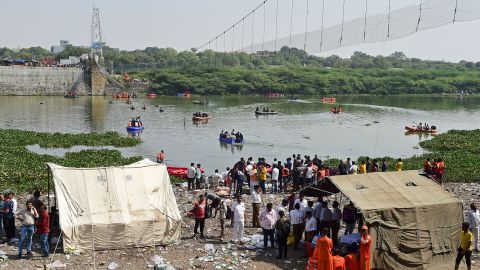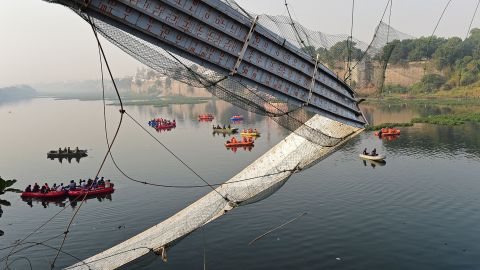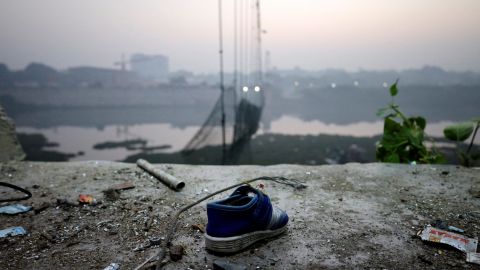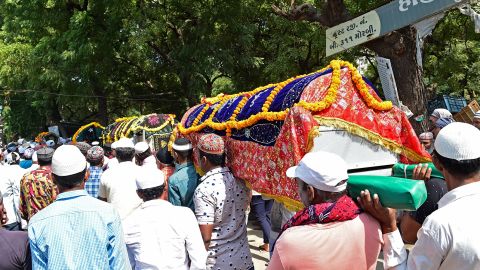What we know about India’s deadly bridge collapse
Some 200 people are estimated to have been on the bridge across the Machchhu River in the town of Morbi when it collapsed into the water below on Oct 30 at around 6:30 p.m. local time, according to Gujarat authorities.

KATHMANDU: The deaths of 135 people in the collapse of a cable suspension bridge in India’s western state of Gujarat is one of the worst public safety tragedies to hit the country in recent years.
As authorities investigate the incident, questions have been raised about how the narrow walkway collapsed and the role of an electrical manufacturing company tasked with maintaining the colonial-era structure, which only reopened to the public last week after repairs.
Here’s what we know.
What happened?
Some 200 people are estimated to have been on the bridge across the Machchhu River in the town of Morbi when it collapsed into the water below on Oct 30 at around 6:30 p.m. local time, according to Gujarat authorities. At least 30 children were among the 135 killed, officials said. It is unclear how many people remain missing and authorities have not released a figure for those injured.
A 36-second video clip shared by the Morbi District Administration via CNN affiliate News-18 shows a large crowd of young men gathered on the bridge in the moments before it collapsed. The video appears to show some of the men shaking the bridge from side to side before the structure gives way, plunging the people standing on it into the river.
Gujarat Home Minister Harsh Sanghavi said on Oct 31 that a cable appeared to have snapped. Photos from the aftermath show people gathering on the riverbank beside the mangled metal walkway, which hung at a sharp angle into the water.

What witnesses say
Survivors and witnesses of the deadly incident described scenes of chaos. “People were hanging from the bridge after the accident, but they slipped and fell into the river when it collapsed,” Raju, a witness who gave only one name, told Reuters. “I could not sleep the entire night as I had helped in the rescue operation. I brought a lot of children to the hospital.”
Narendrasinh Jadeja, whose friend lost seven members of his family, including four children, told Reuters: “I cannot express how angry and helpless I am feeling.”

What we know about the bridge
The Morbi Suspension Bridge was built during British rule around 1900 and is 230 meters (755 feet) long and just 1.25 meters (4 feet) wide. For decades, it’s been a popular tourist attraction in the riverside town, whose cobblestone streets carry the architectural legacy of colonial rule.
The bridge was closed for six months of renovations in April, according to the managing director of Oreva, a Gujarat-based electrical appliances manufacturer that oversaw the maintenance work.At a reopening ceremony on Oct 26, the managing director told reporters the structure would not need any major work for “eight to 10 years,” according to a video of the event posted to social media.

What are authorities doing?
A five-person special investigation committee has been established to investigate the incident, Gujarat Home Minister Sanghavi said on Oct 31. Search and recovery operations by hundreds of personnel from state and national disaster relief teams and the Indian military remain ongoing.
Nine people have been arrested and are being investigated for culpable homicide charges, state police said on Oct 31. All of the suspects are associated with Oreva. They include two managers, two ticket clerks, two contractors and three security guards, according to senior police officer Ashok Kumar Yadav.
What we know about Oreva
Since the deadly incident, public scrutiny has turned to Oreva, a company based in Ahmedabad, Gujarat’s largest city. Oreva started out as a clockmaker before diversifying into electronics, according to its website, which describes the firm as the “World’s Largest Clock Manufacturing Company” and “one of the Major Brands in India.”
CNN has reached out to Oreva several times, but has not received a response.

What’s being done for the victims?
Indian Prime Minister Narendra Modi is expected to visit Morbi on Nov 1. Families of the victims will receive compensation from the Prime Minister’s National Relief Fund, he said.
Gujarat Chief Minister Bhupendra Patel said the state government would provide the equivalent of about $5,000 in compensation per family of the deceased and about $600 each for the injured. Cremations of the victims are expected to begin on Nov 1.










